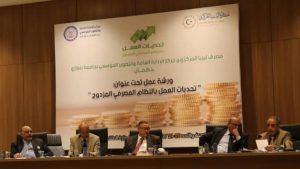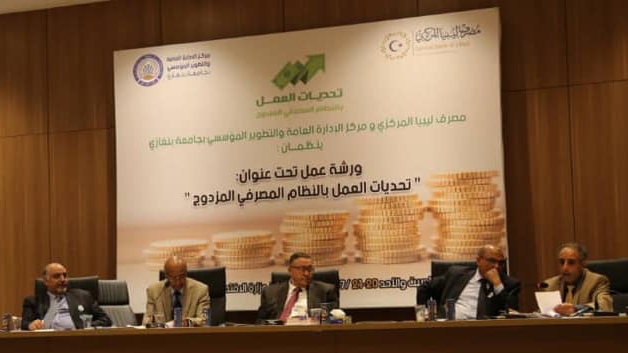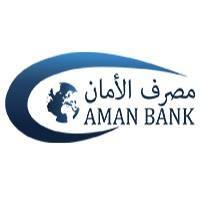By Sami Zaptia.

London, 24 July 2019:
Libya’s eastern-based Central Bank of Libya organized a workshop on the challenges of working with a dual banking system last Saturday.
The workshop made numerous reform recommendations.
In cooperation with the Center for Public Administration for Institutional Development at the University of Benghazi, the two-day workshop entitled “Challenges of working in the dual banking system” was held at the conference room of the eastern Ministry of Economy.
The workshop was attended by a number of members of the House of Representatives, officials of the eastern Interim Government, bankers academics, journalists and business leaders.
In his opening speech, the Governor of the eastern Central Bank of Libya, Ali Hibri, said that he sees the beginning of building a Libyan state on a new bases based on development and stability, after the ending of the militia control of Libya’s wealth in Tripoli for the last eight years.
During the workshop several research papers were presented on the problems and reforms of Libya’s banking system.
At the end of the second day of the workshop the following recommendations were made:
1- That a study of Law No. 1 of 2013, (the GNC law banning banks from charging interest), obstacles to the law and how to remedy them, and proposed solutions. It was stressed that there is a need to reassess the legislative and regulatory implications of Law No. 1 of 2013 in order to activate credit in the Libyan economy.
2- The workshop called for the restoration of confidence in the Libyan dinar and the elimination of the black market, by adopting an exchange rate policy that works to reduce the gap between the official exchange rate and the black market exchange rate gradually until it reaches a unified price that reflects the reality of the market. The aim of this policy is to either end the black market or reduce it a very narrow scope.
The recommendations also called for the adoption of the traditional Islamic-islamic double banking sector and the introduction of a special and integrated law on Islamic banking, stressing that the option of moving to Islamic banking should be left to the banks that wish to do so.
3- The workshop also called for the adoption of a reform strategy for Libya’s banking system that focuses on the foundations of banking (capital control, diversification of banking assets and guarantees of deposits), based on the regulations addressed and discussed in this research.
They reiterated the need to pay attention to the practices and foundations of good governance in the institutional banking work in Libya, and to work to develop the discourse and the coordinating institutional thinking of the Libyan banking leaders based on the clarity of institutional vision, rhetorical coordination and intellectual cohesion in the positions and issues of reform Institutional banking development.
4- The workshop called for the development of a culture of interest in the global trend of bank ownership through BHC banking companies, real empirical studies on the issue of the link between the real economy and the financial economy, and the need for a financial market to link them.
5- The workshop called for the creation of an agreement in the ideas of banking leaders that there should be a financial market in order to positively influence open market operations in the economy and deal with libya’s domestic public debt to absorb the economic problem.
6- They also called for the need to design and activate intensive and urgent human development programs for the higher and middle banking institutional leaders to cope with the high degree of risks resulting in infrastructure, technology, communication systems and modern accounting for banks, which requires raising efficiency to meet this by relying on the entrance to the risk.
7- This workshop reiterated the need for more attention by the supervisory authorities to develop the mechanisms of the banking evaluation system so that inspection reports become an effective tool for controlling the bank and achieving its objectives, and avoiding simulating some models of Islamic banking, especially in Arab countries, with a model to identify practical obstacles and practical solutions to the problems of transformation.
https://www.libyaherald.com/2019/07/23/un-reopening-tender-process-for-audit-of-libyas-two-cbl-branches/
https://www.libyaherald.com/2019/07/19/medics-resign-in-protest-at-cbl-political-interference/
https://www.libyaherald.com/2019/07/11/third-annual-libyan-banking-forum-opens-in-tunis/
https://www.libyaherald.com/2018/12/24/sme-finance-a-new-airline-a-public-transport-service-and-a-union-of-private-banks-announced-at-second-banking-forum/
https://www.libyaherald.com/2017/07/27/109490/
https://www.libyaherald.com/2017/05/29/cbl-launches-mobile-e-banking-with-madar/
https://www.libyaherald.com/2017/05/18/oillibya-signs-up-with-ecobank-for-forecourt-banking-services/
https://www.libyaherald.com/2017/05/04/corruption-in-libyan-banking-sector-threatens-whole-economy-audit-bureau-2016-annual-report/










